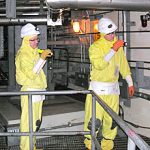Last Updated on July 27, 2024 by admin
Many firms’ IT priority lists include moving to the cloud. Cloud computing provides better scalability, flexibility, and the opportunity to take use of capabilities such as automation, enhanced collaboration, and more.
A thorough architecture design, security analysis and repair, integration effort, and end-user training are all required for a smooth transfer to the new cloud solution. As a result, having the right cloud computing skills is essential before starting an azure cloud migration project. A list of the business and technology skills needed for cloud computing is provided below.
Cloud Computing Skills
On-Premise to Cloud-Based Infrastructure Migration
First and foremost, you’ll require the services of a cloud migration consultant. Someone who has experience with cloud computing and is familiar with the cloud platform that your company wants to use (most likely AWS, Azure, or Google Cloud). Because there are substantial differences between different cloud computing systems, be sure your company has someone who has worked with them before.
Migrating to a SaaS App on the Cloud
Make sure someone on your team is familiar with both the on-premise software and the cloud-based SaaS app in issue if your firm is transitioning from an on-premise hosted app to a SaaS solution. They’ll be well-versed in integration design, the scope of on-premise software modifications that must be migrated, and the accuracy and completeness of data that must be delivered to the cloud, including multi-use fields, custom parameters, and more.
Migrating to the Cloud Requires Certain Skills
Business Analysis
Every stage of a cloud migration necessitates the use of business analysis. To ensure that the company’s best solutions are identified and executed, business analysts will ask and analyse difficult questions. Organisations must consider factors such as:
- Workflows and processes that are already in place
- How they employ technological infrastructure, applications, and data at the moment
- What cloud choices are ideal for your company?
- What is the business impact of migrating to the cloud?
- Assuring the cloud environment and its components’ scalability and dependability Identifying any tools and features that are required
- Identifying any necessary tools and features
The Qualities to Look for in a Cloud Business Analyst
A person who is:
- Gathering requirements for a large-scale change is something you’re probably used to.
- I am very detail-oriented, as evidenced by my ability to produce formal requirements, use cases, user stories, and test scenario documentation.
- Working with developers and technical specialists who are familiar with cloud computing makes putting company requirements into action a snap.
- I’ve previously worked with cloud managed service providers, SaaS providers, third-party system integrators, and other vendors.
- Able to tell the difference between SaaS configuration and customised
Architecture
Depending on the complexity of your migration, you may need an architect to build your new cloud environment and lay out how the apps will connect, what permissions will be required, and how solid governance will be implemented.
What Qualities Should a Cloud Architect Have?
Someone who:
- Understands and can translate corporate strategy, goals, and demands into logical and technical requirements.
- The technical staff can be informed of these criteria.
- Creates the integration architecture as well as the configuration and implementation of cloud functionalities.
- Transforms technical specifications into a functional design and cloud architecture strategy.
- Can find out how to move from on-premises to cloud computing
- Has a thorough understanding of cloud computing, operating systems, networking, programming languages, and the security implications of the cloud environment and its components.
Project Management
It’s just as crucial to have a project leader to drive the cloud migration as it is to have the technical expertise required for cloud computing. A project manager will assist in keeping your migration on track by creating project plans, allocating tasks, and ensuring that the team adheres to deadlines and milestones. By managing day-to-day project components, reporting changes to leadership, managing risk, and managing risk, the project manager’s job is to keep the cloud migration within scope, budget, and time.
What to look for in a cloud migration project manager
Someone who has:
- It’s preferable if you’ve worked on cloud projects before or have experience with large-scale IT transformations.
- A strong capacity to hold individuals to project scope and schedules.
- They’ll need vendor management knowledge because they’ll be working with a variety of cloud suppliers and third-party partners.
- A proven track record of delivering and managing difficult projects
Application Specialist
When transferring apps to the cloud, companies need application specialists on their team who are knowledgeable with cloud computing, database management, containerization, and the coding languages used by the apps and integrations. If you’re converting from on-premises software to a SaaS solution, you’ll need an Application Specialist to configure and maybe customise the new cloud-based app to meet your company’s specific needs.
What to Look for in a Mobile App Developer
Someone who possesses:
- Experience moving to a cloud vendor (Azure, AWS, Google Cloud), as well as the type of environment you’re migrating to (public, private, hybrid)
- Working knowledge of setting SaaS solutions to fulfil unique business requirements
- Designing databases, programming, and providing application support are all abilities that you should have.
- Deep understanding and experience integrating cloud-based apps and systems
Infrastructure Specialist
Transitioning on-premise settings to the cloud requires the help of an infrastructure specialist. Building, installing, and administering the new cloud computing infrastructure will be the first line of defence for the pros. They can also assist in the decommissioning of on-premise hardware or the conversion to a hybrid setup in which some tasks are managed by cloud computing and others are maintained on-premise.
What to Look for in an Infrastructure Professional
A person who is:
- Has worked in a hybrid computing environment before
- Develops and manages multi-processor virtual machine (VM) clusters and pods.
- Can build in the required robustness and dependability into the new cloud environment
- Create new virtual machines for email, intranet, VLANs, firewalls, VPNs, and cloud-based core business applications.
- Has experience with a variety of operating systems, scripting, and virtual machine management software.
- Can estimate the amount of bandwidth required to manage internet connections for cloud access.
Apart from this if you are interested to know more about Skills Required To Be A Web Designer then visit our Business category
























